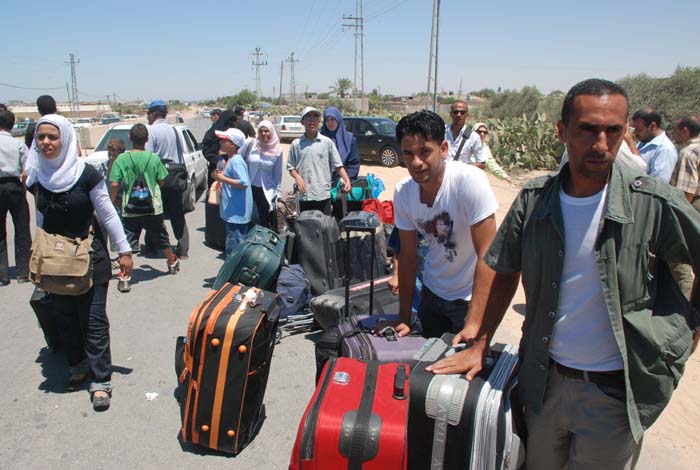
Ref: 75/2015
PCHR follows up with concern the deterioration of humanitarian conditions of civilians in the Gaza Strip due to the Israeli-imposed closure on their movement and travel from and to the Gaza Strip; including the closure of Beit Hanoun (Erez) crossing that denies over 95% of the Gaza Strip population the right to movement to the West Bank and abroad. Rafah International Crossing Point was re-opened for only two days after 104 days of closure. Only 1,539 Palestinian civilians were able to travel to Egypt and abroad, including humanitarian cases whose health conditions deteriorated or their interests abroad negatively affected. However, over 20,000 persons have been waiting for Rafah crossing to reopen again; the majority of whom are patients whose medical treatment is not available in the Gaza Strip, students joining universities in Egypt and abroad and those holding foreign residency permits or visas. Since the beginning of 2015, Rafah International Crossing Point was closed for 315 days and only opened for 23 days.
PCHR believes that the suffering of the Gaza Strip population is attributed to the ongoing illegal Israeli closure imposed on the Gaza Strip for over 9 years. The Gaza Strip is considered a part of the occupied Palestinian territory (oPt) under the provisions of the international humanitarian law; therefore, Israel as an occupying power has main obligations towards the oPt population. Accordingly, the Israeli authorities must immediately declare the end of the illegal closure imposed on the Gaza Strip and allow the freedom of movement for persons and goods as it is a grave violation of the international humanitarian law and rises to the level of a crime against humanity. The High Contracting Parties to the 1949 Geneva Conventions should pressurize the Israeli authorities to comply with the rules of the international humanitarian law and open all border crossings with the Gaza Strip, including Beit Hanoun crossing, the sole outlet between the Gaza Strip and West Bank, including Occupied Jerusalem. This would enable the Gaza Strip civilians to move freely between the Palestinian cities on the one hand and the world on the other hand.
However, the main reason behind the closure of Rafah crossing is related to the Palestinian political split since 2007 and failure of all parties’ efforts to find a solution that guarantees the permanent opening of the crossing and meeting the Gaza Strip humanitarian needs. It is unfortunate that the interests of both parties to the political split overweight the humanitarian needs and interests of the Palestinian civilians. In the meantime, Palestinian civilians aspire to have a humanitarian passage par excellence far from any narrow interests of either party ensuring the freedom of movement and safe travel in dignity. PCHR emphasizes that the Palestinians’ suffering and pains should not be compromised on.
In light of the above, PCHR proposes an initiative for the International Committee of the Red Cross (ICRC) to temporarily supervise the operation of Rafah crossing for humanitarian reasons until the Palestinian parties to the split reach an agreement that ensures the permanent and regular operation of the crossing. PCHR’s initiative is based on the ICRC humanitarian role under the 1949 Geneva Conventions and the role it used to play after the 1967 Israeli attack.
PCHR calls upon the Palestinian parties, including the Palestinian Authority and Hamas movement, to immediately respond and announce their consent and support for that initiative in light of their failure to actually respond to the Gaza Strip population’s humanitarian need to travel to Egypt and abroad. Moreover, based on the strong ties between Egyptians and Palestinians, PCHR calls upon Egypt to respond to the humanitarian need of the Gaza Strip population and offer the necessary facilitations for movement and travel from and to the Gaza Strip via Egypt, especially in view of the tightened closure imposed by the Israeli authorities on the movement of civilians in the Gaza Strip.
PCHR calls upon the ICRC to accept this initiative and see to what extent it can be applied in cooperation with all parties.